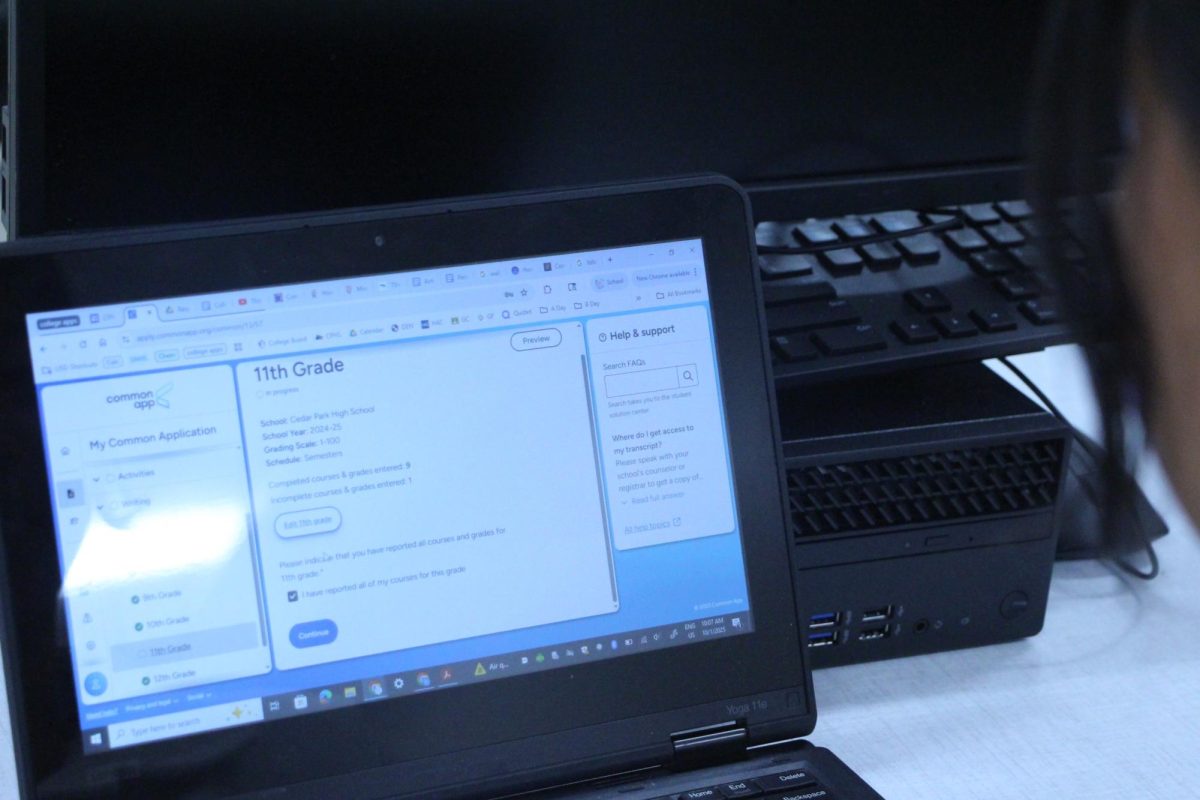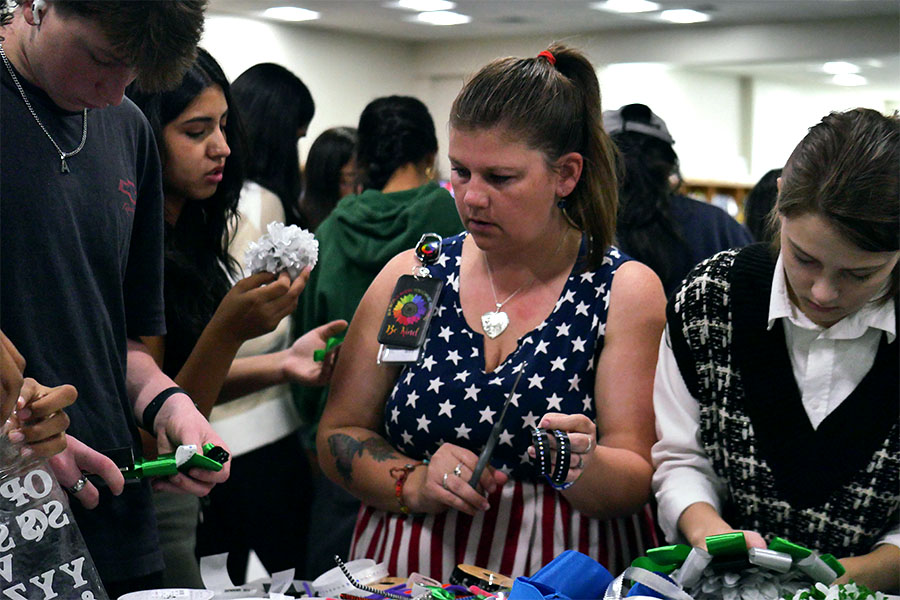A law has to start somewhere. Every law that is now in place was just a bill at one point. It’s a long, long journey to the capitol city, but eventually, a mere bill may become a law. This year’s process began January 13, with the Texas Legislature going into session to improve Texas in a variety of ways. Public education is an especially important issue in Texas, therefore a good portion of the bills submitted for 2009 aim to change several aspects of the education system.
Senate bill (SB) 101 would directly affect high school students. It would prohibit UIL events from being held at the same venue two years in a row, unless a different place absolutely could not be found.
“It’s obvious that the legislation is being backed by legislators who don’t know what this means for all UIL activities,” Phillip Guebert, junior and UIL Band participant, said. “For band, the Alamodome is part of the state experience. Holding it somewhere else would take away from the competition.”
Interestingly, SB101 only seems to apply to regional and state-wide competitions, leaving out area-wide competitions, which come after region and before state. It is unclear if the author(s) of this bill intentionally meant to exempt area competitions from this rule, allowing them to consistently be held at the same place every year.
“I don’t understand why you’d want consistency on the second level but not the first,” Katie Walker, sophomore, said.
Another interesting bill, SB 183, would make special schools for mentally handicapped kids, eradicating the special education programs in public schools. It is unclear whether these schools would be created and maintained with citizens’ tax dollars or with vouchers. According to an article written by Vince Leibowitz, Texas representative, the program would result in “special ed students who are less prepared for the real world than they would be with a public school because they’ll be attending schools that, under the bill, are held to almost zero accountability for the quality of education they are providing.”
Kendra Shaffer, Executive Director for K-12 Programs of LISD, thinks that this bill wouldn’t even make it out of committee.
“The passage of Public Law 94-142 and subsequent re-authorizations put into place many safeguards to protect the rights of people with disabilities in the education setting,” Shaffer said. “Passage of [SB 183] would be going backwards. Every student, regardless of their disability, has a right to an education with out being segregated or discriminated against. Students with and without disabilities learning beside one another provides many benefits.”
Various bills regarding higher education (colleges and universities) have also been filed for the 2009 legislative session, several of which would limit tuition increases.
SB 214 puts a five percent cap on annual tuition increases, allowing for inflation adjustments but not much else. SB105 limits annual tuition costs to no more than the cost of a student’s previous year at the higher education institution, with the exception of inflation adjustments. House bill (HB) 21 is essentially the same thing, but limited to undergraduate students. The tuition would freeze for a cycle of four or five years, depending on the undergrad’s degreeSB 214 puts a five percent cap on annual tuition increases, allowing for inflation adjustments but not much else. SB105 limits annual tuition costs to no more than the cost of a student’s previous year at the higher education institution, with the exception of inflation adjustments. House bill (HB) 21 is essentially the same thing, but limited to undergraduate students. The tuition would freeze for a cycle of four or five years, depending on the undergrad’s degree.
“In my opinion, HB 21 has the best chance of getting passed because it presents a compromise solution,” Donna Howard, state representative for Travis County, said. “This proposal protects a student from tuition increases while still allowing institutions of higher education the flexibility to set tuition rates for incoming students at a level that keeps up with the cost of providing a quality education.”
These proposed bills are the result of the legislature’s choice to deregulate tuition in 2003. This basically means that they allowed higher education facilities to choose their own tuition rates, in order to save the state money, because Texas was confronted with a $10 billion budget deficit. Since 2003, tuition rates have steadily increased. SB 105, HB 21, and SB 214 are all attempts to reregulate tuition costs.
“Had I been in office [in 2003], I would not have supported the decision to deregulate tuition rates,” Howard said. “Now that the decision has been made, I do not agree with legislation that limits tuition increases without providing institutions of higher education with more state funds. As a member of the House Committee on Higher Education, I support leaving tuition deregulated and focusing on increasing the state’s funding of financial aid programs like TEXAS Grants and the B-On-Time loan.”
Another possible change besides reregulation of tuition costs presents itself in the form of HB 52, which would put a 40 percent cap on the “Top Ten Percent” program that guarantees high school top ten percent students’ admission to Texas’ higher education institutions. This means that the institutions have to reserve 40 percent of each incoming freshman class for top ten percent students, with no requirement that they admit any more than that. SB175 does the same thing, but has a cap of 50 percent.
“Some students become discouraged from applying to colleges such as UT because they feel they’re not ranked high enough in their class to get in,” Michael Staalenburg, senior, said. “With a forty percent cap, the doorway is a little bit more open.”
SB 185 is a proposal of overall change in higher education, submitted by state representative Kirk Watson, who represents most of Travis County.
“[SB 185 would require] the state to take a hard look at its higher education institutions and find a way to make them better… for our students and for our Texas economy,” Watson said. “As part of an effort to establish a long-range plan for higher education, one of the specific charges of the legislation will be to look at assuring appropriate and necessary funding for our public universities and colleges.”
Whatever the population’s opinion of the education bills is, the final decision will be made by the members of the Texas Senate and the Texas House of Representatives by June 1. Despite this, every citizen can have a say in what bills get passed. The involvement of students in education-related issues is important, and can easily be done by contacting local representatives and senators.






![As her hair blows in the wind, senior Brianna Grandow runs the varsity girls 5K at the cross country district meet last Thursday. Grandow finished fourth in the event and led the varsity girls to regionals with a third place placement as a team. “I’m very excited [to go to regionals],” Grandow said. “I’m excited to race in Corpus Christi, and we get to go to the beach, so that’s really awesome.” Photo by Addison Bruce](https://cphswolfpack.com/wp-content/uploads/2025/10/brianna.jpg)


![Broadcast, yearbook and newspaper combined for 66 Interscholastic League Press Conference awards this year. Yearbook won 43, newspaper won 14 and broadcast took home nine. “I think [the ILPC awards] are a great way to give the kids some acknowledgement for all of their hard work,” newspaper and yearbook adviser Paige Hert said. “They typically spend the year covering everyone else’s big moments, so it’s really cool for them to be celebrated so many times and in so many different ways.”](https://cphswolfpack.com/wp-content/uploads/2025/05/edited-ILPC.jpg)





![Sitting with her friend senior Sohpia Struve at last year’s Austin City Limits Festival, senior Ava Zuniga poses for a picture under a pavilion. They are frequent attendees at ACL, an annual music festival at Zilker Park. “I would recommend seeing a bunch of people,” Zuniga said. “This past year, we camped out for Chappell [Roan] for a really long time. I think the whole point of ACL, [which] is a lot of fun, is that you can go see so many different people, even if you don’t know them. So by camping by one person, it really limits yourself from being able to go see a bunch of people.” Photo courtesy of Ava Zuniga](https://cphswolfpack.com/wp-content/uploads/2025/10/EE9E9484-FE6F-4AA0-B5F5-0C177AB32841-1200x857.jpeg)
![Looking down at his racket, junior Hasun Nguyen hits the green tennis ball. Hasun has played tennis since he was 9 years old, and he is on the varsity team. "I feel like it’s not really appreciated in America as much, but [tennis] is a really competitive and mentally challenging sport,” Nguyen said. “I’m really level-headed and can keep my cool during a match, and that helps me play a bit better under pressure.” Photo by Kyra Cox](https://cphswolfpack.com/wp-content/uploads/2025/09/hasun.jpg)

![Bringing her arm over her head and taking a quick breath, junior Lauren Lucas swims the final laps of the 500 freestyle at the regionals swimming competition on date. Lucas broke the school’s 18-year-old record for the 500 freestyle at regionals and again at state with a time of 4:58.63. “I’d had my eye on that 500 record since my freshman year, so I was really excited to see if I could get it at regionals or districts,” Lucas said. “ State is always a really fun experience and medaling for the first time was really great. It was a very very tight race, [so] I was a bit surprised [that I medaled]. [There were] a lot of fast girls at the meet in general, [and] it was like a dogfight back and forth, back and forth.” Photo by Kaydence Wilkinson](https://cphswolfpack.com/wp-content/uploads/2025/03/Kaydence-2.7-23-edit-2.jpg)
![As the support team sits and poses for a photo in the cafeteria with the counseling team they eagerly wait to start their day. "We [all] seem to be a team, I get up every day and there's days where I don't want to go to work today, but I'm thankful that I have a job and I'm blessed to have what I have," Christopherson said. Photo Courtesy of Julie Weltens.](https://cphswolfpack.com/wp-content/uploads/2025/01/AF9E8470-10D7-4C91-BF28-EC8F86BAB66C-1200x852.jpeg)
![Jumping off the ground, senior linebacker Bennett Patton snatches the ball out of the air for an interception at Thursday’s game against Chaparral. Patton had two interceptions in the 56-14 victory, tying the school record for interceptions in a game. “I was just playing the game,” Patton said. “[I’m] going to go into next week, forget about it and stay humble.” Photo by Harper Chapman](https://cphswolfpack.com/wp-content/uploads/2025/09/bennett-interception.jpg)














